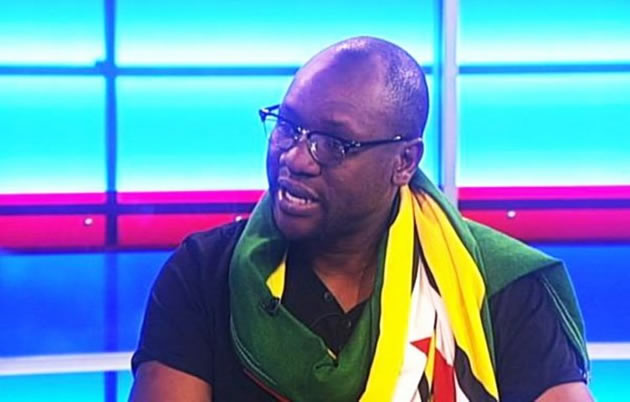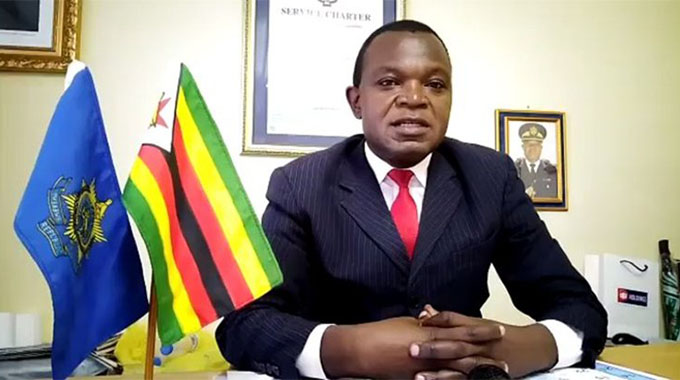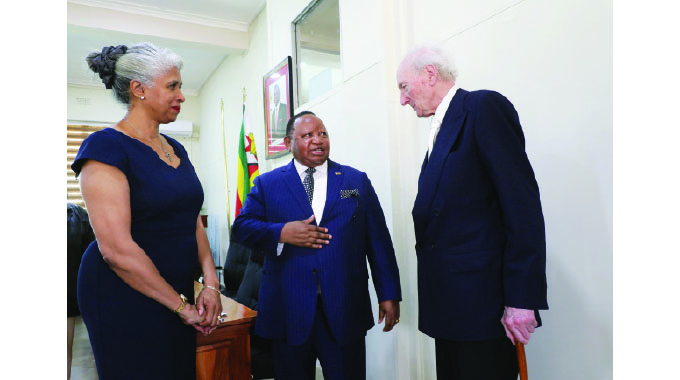Graduates: Builder, Pole, Daga, Thatch


Just imagine a Mawarire who calls for an uprising from the safety of some South African university, who takes him seriously?
Nathaniel Manheru
I am truly grateful to the many people who joined in the debate to my instalment last week which focused on graduates and employment. It is the most commented upon piece I have done to date, clearly showing I picked on an issue that touches many people. Indeed, this is what columnists must do: tackle issues closest to society, no matter how hard, how hurtful, how unpalatable. And to do so without caressing for kisses or cringing from brickbats. And many brickbats ceaselessly landed on my already battered body. To this day they still do but I carry my cross with manly honour. But first things first.
Beyond Zvakazarurwa
Writing presents a columnist with a stark choice between describing the world as it is or as it should be. The latter is what they term writing from a normative perspective, that is, presenting reality as wished for by moral talibans, by authors of pulpit homilies. I am not attracted to that kind of writing, which is not to say I am oblivious to the norms and values that underpin my society, ignorant of what passes for good, for bad moral conduct. But let’s face it, I am not here to reproduce beatitudes, to extend the Bible beyond Zvakazarurwa.
The Bible is big enough, fat enough, which is why I agree totally with my President when he asks of pastors kuti “ko bhaibhere mati mapedza kuriverenga here zvomonhanhira politics?” Here I give you the world as it is, raw, ugly with its warts and all. I am surprised there are some “John Bunyans” in our midst who crave for moral fables, who express consternation at being reminded that winning political parties have their first obligation to their constituencies, indeed govern to grow them. To be reminded that governing political parties hope not to wield transient power, strive to have it until Kingdom comes. To be told constitutions are one thing, politics and political practice quite another.
Ndihwo hukomuredhi?
I suppose it is this Bunyan-like naïveté which inspires that fond line of the opposition press which says ZANU-PF’s preoccupation and concern is keeping power. What should be ZANU-PF’s preoccupation? To lose power? To have it in order to hand it over? My goodness! The world as it should be, never as it is. You think Machiavelli was only Italian! And why remind ZANU-PF that its full-time role is to retain power? Much like asking the Pope why he is always praying, twiddling with the rosary. What do Popes do?
Make way to SDAs? Not far back, we had a variant of that same naive argument: those who liberate the country should not govern it! Really? The liberators slog it out in bloody battles, only to hand over the crown to wise Alecs who coxcombically keep very far away from the arena of struggle, twiddling their feminine fingers, adjusting their bow ties, all in readiness for the zero hour handiti? Ndihwo hukomuredhi nhai? Hwuchauya hahwo. Mirirai.
The sun shines to those standing first
There was also another question: why tax us if your mission is not to benefit us, is not to make us your vocation, your darlings? Well, you are taxed, heavily hopefully, and will continue to be. There are what are termed public goods which you enjoy gratuitously: peace, security, infrastructure, various civic and social services like education, health and much more, regardless of how badly you voted, how badly your side lost the vote. That is more than enough basis for levying a hard tax on you, and please pay, hopefully to vote wiser next time. And next time is 2018.
But for you — an out and out MDC supporter — to accost a ZANU-PF government for the fulfilment of a ZANU-PF manifesto you strove hard to defeat in the last election, is rank madness. How do you know ZANU-PF is done with those who installed it, and thus to whom it governs beholden? The sun shines on those standing first, before it reaches those who have elected to crouch under a cave. And like I said last week, ZANU-PF got more than 2 million votes, enough for the jobs it promised.
There will not be any leftovers, I am sorry. We are set for another poll. You can choose to remain under the cave or to stand up with the rest, in readiness for the coming sunshine. Already the writing is clear on the wall. ZANU-PF will win hands down, and as before, you will be stuck with my party, governed by it. That is what happens in a democracy. You don’t have to like it. The world as it is, not as you like or wish it. And I write not from the ivory tower, not from a prayerful plinth, but from the hard field where I work extra hard to ensure ZANU-PF is re-elected, wins.
The ugly win the hand
Let me help you dear idealists, ndikubayire zanhi mwachewe. Politics is not righteous, a game where you offer the other cheek after a hard slap on the one. A game you help up an opponent you have felled. It is no place for magnanimity shorn of calculation. When Hilary Clinton says she will be a president for Democrats and Republicans, for all Americans, she makes no mistake of starting with Republicans.
She starts with Democrats and, as the Obama era has shown, ends with them. She projects, simulates a uniting figure to triumph in a partisan election, to secure a partisan dispensation, indeed to get the better of Trump who does not seem to know that you campaign on simulation and govern on stimulation, all to augment your re-electability.
You pretend magnanimity in order to ingratiate yourself with the undecided voter. You don’t see people, you see voters and votes. The good thing is as you seek voters and votes, your quest coincides with the majority, if you are set to be the winner, and therefore with the public weal. That is the simple arithmetic of politics. That is how you earn your colours, get re-elected. Not pretty if you ask me, but as often, it is the ugly who win the beautiful hand.
The shibboleth of national politics
ZANU-PF fought the war, won support by correctly interpreting what it termed “national grievances”: the collectively felt yearns of the black majority. Freedom, independence, dignity, self-rule, and above all, the land, the land that had to come back to its rightful owners. It located its struggle on a set of near-timeless grievances, which is why its politics hold sway to this day, a good 36 years after Independence.
It hogged all the grievances of a people, made them its own, made them synonymous with itself, adjusted them as times changed, but without losing the typifying core, which is why it shall rule for a very long time to come. Today its manifesto is the shibboleth for all politics. And because these are national grievances, Zanu-PF has a legitimate claim to the use of the phrase “the people”, that key idiom by which mobilization politics are interpellated, by which legitimacy is wrestled while being denied the opponent. You would be a political fool if you don’t get it.
Writing the next voter register
Biti got it regrettably by hindsight — political hindsight — long after losing 2013. To paraphrase him: we harped on abstracts, on neo-liberal nothings, while ZANU-PF concretely offered land, promised indigenisation and economic empowerment, he opined long after a hefty trouncing. The surprising thing is he is no wiser today, lounging with the Democrats in the US while ZANU-PF services residential stands, giving them out to the young and expectant, in the process writing the next voters’ register.
From there, he will bring back the art of making soundbites, the art of dressing political events for cameras. But to a peasant voter who cherishes the gift of a hoe, and readily folds a newspaper for his pocket in anticipation of his next smoke, America is a land so far away. A bad country too, as said by Zanu-PF, the author of his politics. And there is consistency, perfect consistency in ZANU-PF’s current moves. It is a continuation of the land reform programme, only this time taken and interpreted for urbanites, for urban settings.
Behold a soothsayer from down south
2018 will mark that poll when our society makes that key transition demographically: from an amphibian town-country voter, to a wholly town voter. Good politics look ahead, reposition themselves for changes to come. The opposition must worry big time. ZANU-PF is not just serving its membership; it is growing it by eating into that stratum wont to vote the opposition, deracinated from the land and countryside, or wont not to vote at all. They are being enthused. Meanwhile, back in the village, no month passes without food relief distribution for all rural inhabitants who belong, must belong, and routinely vote ZANU-PF.
Typically, as ZANU-PF chases after new voters, it makes sure old ones are satisfied. There again in the rural areas, the voter register is being consolidated. And look at our politicians on the other side, on the nether of national politics: they hope to extend the hashtag campaign to rural areas! Look at the lot that carps in newspapers, on YouTube, that mounts telegenic demonstrations in London, Melbourne, New York, Johannesburg, etc, etc, etc. Who cares about them? They don’t vote.
Like Mawarire, they not only run away, but criticise ZANU-PF to make themselves eligible for donor funding, after which they fade away, into happy oblivion, well provided for. Just imagine a Mawarire who calls for an uprising from the safety of some South African university, from an ivory tower! Who takes him seriously? Yes, they run away, vote with their feet. It is not the lion that bellows three villages away that worries a stranded villager clinging up a big tree; it is the little, quiet deadly puff adder next to the bow he rests on.
A hardy people
Which takes me back to the theme I broached last week: graduate unemployment, graduates and the millions of jobs they owe this society. Not themselves. But first, my gratitude to one of my readers who called himself “Etc”. You got the argument mate, as did a few more I cannot acknowledge here! We built the Great Zimbabwe. From hard stone which we made ductile through sheer will. Tamed an unyielding medium until it gave us shelter, gave us lasting fame that defies time now, time future.
The monuments will always be there, a durable footprint and testimony to what we are capable of, isu Madzimbabwe, the People of Stone. Much more, we tamed fire, tamed iron, which is why gomo reHwedza is key in our collective lore. Even the gods would not ignore us. We accosted them until they made a date with us, gave us rendezvouses by way of the various shrines from where we communed with them, still commune with them to this day, to ask for rain, for fat pumpkins, long cobs, for peace and general collective wellness.
When we rule races
Yes, there are strangers who sleep atop some of our shrines — foreigners who sleep atop our meeting points with the gods — but what has that stopped? We still speak with the departed who faithfully take our cause to the Almighty, iye Zame, Matangakugara, the First Inhabitant, as we call God.
Zanla fighters had a song I am wont to hum whenever in solitude: Honai hondo iyi urikuririma/Hondo iyi hondo yeChimurenga/Inouya yakabate gidi/Rusununguko rawatisvikira. Roughly translated, the song says: Behold the flaming war/It is the war of Chimurenga/It comes wielding a gun/Freedom is already upon us. The next stanza speaks of the broad masses embracing the fighters, feeding them, keeping them, protecting them, in their havens, mabhesi.
The chorus then breaks out: Tototonga-tonga totonga marudzi/Tototonga-tonga totonga marudzi/MuZanu mune rusununguko. Again roughly translated: Soon we govern all races/For freedom inheres in Zanu party. For me it situated the likes of Rhodes, his ilk and descendants still with us to this day. Much as I would have wanted Rhodes and company dug up and thrown out of Matopo, today they lie there as subjects of majority rule, a clear testimony that muZanu mune rusununguko. We govern races that have chosen Zimbabwe as their home, we the People of Stone.
When I was alone
In summary, we tame stone, tame fire, tame iron, tame and govern imperious races. So why cut and run now? Why buckle before lesser, more menial tasks, we a hardy people? Running off to become servants of other nations? Crumbling before lesser tasks, more ductile assignments? This is where I go mad, raving mad, for the trouble is somewhere in us the elites who lead, who must lead. And leading is not just political. It spans the whole gamut, covering the socio-economic.
Come to think of it, we are well led politically. However you view ZANU-PF, however uxorious you may be about the MDCs or its latest absconding fad, Mawarire, you the graduate are the living testimony, the personification of how well the politician has led us. The ZANU-PF politician. I went into University in 1982, enrolled into College from Buhera, my home area.
Apart from my elder brother Michael — Miki the village called him — I was destined to be the second graduate in the area. I am not talking of the whole district, although I argue that then, graduates would not fill my two palms. I want to believe Buhera was no exception; its predicament was fairly representative of the state of affairs in all districts of the country emerging from settler colonial rule.
Casting my eyes to now, Buhera teems not just with graduates, but with numerous postgraduates and doctoral qualifications. In my own village, graduates are numberless, something unheard of at Independence. The politician has delivered. Schools are in abundance. The colonial bottlenecks have become bulging bottle bottoms.
The same holds for many other amenities we yearned for under Rhodesia. And this I know not from reading, but from experience, for I lived Rhodesia up to the age of 17, ndatove chimunhu choziva. I am a midnight child: one half of life lived in colonial Rhodesia, another half in Independent Zimbabwe. I have a comparative perspective.
Blanket as mat or cover
The graduate who accosts the politician today is evidence of the politician who has delivered, asakura, azunza. Zvosarirewe, kufuga and kana kuwarira, as Mtukudzi would say. But the blanket you have, more accurately, you got! At huge cost to this society too. Much more, at great cost to job creation, which is why the educational vote combined is the largest year in, year out. It is called social investment. Early on in Independence, the Bretton Woods institutions had discouraged the President from putting accent on education.
He defied, and you are the fruit of that defiance. Today he has “stemised” that education, to make it responsive, again at great expense. You are, have been, the sole beneficiary, you Mr Graduate. But like the proverbial lazy village boy, you ask: Ane mimba? (Is she pregnant?) when offered a beautiful girl you never took the trouble to court! Enough of hard words; let me get concrete to demonstrate the many jobs staring you in the face while you look away, while you trudge the streets, yelling at the accomplished politician.
Enter STEM
This year, Government announced its STEM plan, all against a staggering statistic of students who had gone through “O” Level, but without science passes. In my village, the talk is “ndiri kusupplemenda kuti ndipase maths nescience”. Going to get a cold beer at the township after some work in the village, I see so many derelict buildings — some belonging to failed businessmen, some to government, others to old rural councils. I also see many empty classrooms, especially after the teaching day, all lit under the Government’s Rural Electrification Programme.
Lots of idle rooms; lots of eager learners struggling to be STEM-compliant. Yet you don your graduation gown, ply the streets accosting passers-by to buy your putrid wares, you Mr Graduate? Who teaches those eager souls? How much money is made from such endeavours? How many jobs? During our days we used to call it TIRA, teaching in rural areas, and we bought big transistor radios from proceeds. What of you? Seeking cheap publicity as if your picture in the Daily News changes anything!
How many broadcast hours, my dear brother?
Last year, the same Government embarked on a programme to migrate the national broadcast system from analogue to digital format. All told, 12 high definition television channels are expected. Or well over 40 television channels if Government chooses to go standard definition. Those channels need content enough to fill a day, enough to fill a week, enough to fill a month, enough to fill a year.
In Nigeria, that is a $10,3 billion industry. Working with 12 HD channels, that translates to a minimum of 60 480 broadcast hours per year per channel. Or 725 760 broadcast hours for the 12 channels per year! The same Government has availed free cameras, free editing suites, free transport for shoots, hot meals for all your shooting hours and . . . and a commitment to buy generously your first three projects provided they meet broadcast standards I know have been made lax. To date, only non-graduates have taken this up. As I write, Masvingo is a hive of activity. So are Bulawayo, Lupane and Binga. You flaunt your gown in the street, losing it to the wintry August, as if you are a vending angel, Mr Graduate?
And OGIL?
Last month, the same Government stopped all finished goods importations. A multi-billion dollar business that profited Indians, Chinese, Lebanese and Ethiopian traders in Musina. Not even black South Africans, our neighbours and brethrens, but their white manufacturers. Our graduate vendor reads and writes, speaks good English, reads newspapers.
Or should. Minister Bimha announces those engaged in importing finished goods must now turn to importing much-needed raw materials for the local manufacture of the same goods previously imported. Have you, Mr Graduate, picked a copy of the gazette to see what items have been struck off the Open General Import Licence so you work backwards to know which factories will now step in to substitute those imports, and what their import needs are? You whose expertise is in cross-border buying and selling? And you do not need any capital. You need an undertaking by the said company to open a line of credit with a bank! No, you won’t bother, choosing to parade your black garment before bored, modestly educated photographers who have a job you don’t have.
How about building?
Yes, the same Government has embarked on residential stands development. That vast programme offered many opportunities, both by way of backward and forward linkages. There are many building skills in the country awaiting to be hired, to be organized, to be run under a proper company by you, eater of big book. It does not cost you anything: just rounding up builders who abound, to form a construction consortium and then looking for building projects which Local Government or cooperatives are ready to give!
They buy their own bricks, their own cement and simply ask you to offer your skilled builders. I also read Lupane University will soon relocate to its real premises. Predictably there will be a critical shortage of accommodation there. Does that stir your educated mind, Mr Graduate? The ground is there, rural, very cheap, given out on generous terms.
All you need is a commitment by the Vice Chancellor that the university will consider your compounds for student accommodation. You have brothers in the diaspora who don’t know where to invest, where to put money. Local godfathers even. Here is a need, a crying need which is enough to secure a line of credit with any bank. Or you hate mud, love spacious offices of Lever Brothers? Well, Mr Lever started somewhere small and dirty.
You reach Alibaba and all
The same Government recovered land, put thousands of families on that land. Overall, the land is being utilized to varying levels, depending on ability, commitment, funding and mechanization. Most probably you grew up on the land, in the countryside, Mr Graduate. Today the same Government wants an all-out programme for maize production to meet national needs by next year.
Does that mean anything to you, stir you at all? And many farmers are keen to value-add on farms, express their soya for the cake they badly need for their animals. They do not know where to get equipment for such value addition. You do. Through your computer skills, your googling expertise, you reach India, reach China, know about Alibaba. You can google the technologies needed by these small farmers, know how to make a good project proposal for funding to bring them here, duty free. Yet you don’t.
Instead you are busy enjoying pornographic material, titillating yourself to purge yourself begotten frustrations. Even in this year of crippling drought, Alibaba advertises one-man operated well drillers that go up to 80 metres deep, selling for $5 000 or less. No, you see the searing drought, the suffering and the opportunity for regime-change agitation that will not succeed. That is all you see only, Mr Promise! Not the business opportunity.
Governments have no business
Or simply beating the streets in the industrial areas to get prices of different agricultural commodities to create an on-line marketing advisory for farmers who don’t know where to take their tomatoes, soya beans or maize to advantage. But you are an agricultural economics graduate. A marketing graduate. Just think of the many eateries in Harare alone, the quantity of tomatoes they use every day.
Onions. Think of the villagers from Mutoko who come to dump their tomatoes at the Mbare market every day, without knowing there is a better remunerating market elsewhere. Or that there is a joint venture tying ZAGRINDA and Schweppes in Norton running out of feed-stock of industrial tomato. Yet we all yell that Governments have no business doing business. Theirs is to create an enabling environment. I grant that. If so, how is it their business to create 2 million jobs? How have they not enabled you given the above sample examples I picked on in a hurry? Where are the start-ups?
Pole, daga, thatch
Which takes me to Mudhara Dzobo from my village. By all counts an amazing builder who cut his professional building teeth with Sisk in colonial days. He worked, worked and worked for the white men, worked under Sisk until one day his back cracked and he was discharged with a pittance of $800. He went home, and home was along my way to a local primary school.
Like all rural homes, the only functionally attributable structure was the smoke-besotted hovel we took to be the family’s kitchen. Apart from it, there was this other pole, dagga and thatch structure which gave its back to the road that took us to school. One fateful day, my tough grade seven teacher required all pupils be in class by 5 o’clock the following morning.
Masara was his name, from somewhere in Nyanga. We knew him to have a swift hand. No one wanted to cross his path. He announced that all pupils be seated by 5 o’clock. It was in winter and the first light took long to brighten the road. About 4 o’clock, I was on the road, careful to escape my tough teacher’s ire by reporting an hour early.
A naughty recall
As I ran past this functionally unclear structure whose back was to the road to the school, I picked some weird grunts, some repeated thud that threatened the whole structure. Though young and innocent, instinct told me this was a very happy morning hour for mudhara Dzobo nambuya Chiga, his wife. Naughtily, I treaded softy, preening my eager ears. Boy o boy, behind the rickety pole and daga hovel was a happy old couple, completing the offices of love.
A heavy heave and then a cough of contentment followed, and I knew it was time to speed off to the schoolyard. Each time I go home, I meet the product of that encounter, now a big village elder with a long brood who answer to his surname. The happy old couple — his parents — is long dead. He does not know how he was made, how noisy the process was. I always giggle when I see him, and he thinks I am happy to see him. The old couple is dead like I said. But for a while, their bedroom remained standing, defiantly, it seems.
Then a crack developed, apparently from the very portion the thud came from that happy morning. A line of weakness after so many thuds. Still we rejoice at a life that was created, today a whole full family whose head is a true scion of mudhara Dzobo, the accomplished builder who erected a city, but sired under pole, daga and thatch that would not contain or muffle his happiness for full privacy. As I recall this incident — with a giggle of course — I sadly read a debilitating destiny. Sadly see a people who sell skills they themselves cannot consume. My people.
Icho!








Comments